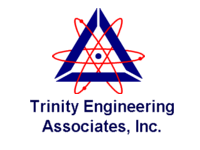
Radiological Emergency Preparedness
Environmental Compliance and Regulatory Analysis
Nuclear and Radiological Engineering
Quality Assurance
Information Technology and Software Development
Copyright © 2009-2020 by Trinity Engineering Associates, Inc.
This page was last modified October 6, 2020.
Environmental Compliance and Regulatory Analysis
Capabilities
Trinity offers project and personnel expertise in a wide variety of areas relating to environmental compliance and regulatory analysis, including:
- Support for Rule Making,
- RCRA Permitting Support,
- Technical Inspection, and
- Response to Public Comments
- Environmental Impact Statement Analyses
For additional information about Trinity�s capabilities and services in the area of environmental compliance and regulatory analysis, contact Kim Wood at (513) 521-3515 or krw trinityea.com.
trinityea.com.
Qualifications and Major Past Experience
Trinity has considerable experience in the development of technical support and background information documents for various rulemakings, including the incorporation of public comments and the reconciliation of conflicting comments.
Since 2002, Trinity has provided comprehensive support to the New Mexico Environment Department (NMED) in their administration of the RCRA Part B Permit for the Waste Isolation Pilot Plant (WIPP) site in Carlsbad, New Mexico. As part of this support, Trinity provided technical document development and review in the form of white papers and review reports of other technical documents produced by the Department of Energy (DOE), National Academy of Science (NAS), and Environmental Evaluation Group (EEG), etc. Trinity has provided support ranging from evaluation of permit modification requests (Class 1*, Class 2 and Class 3) to expert witness hearing support. These activities required technical and regulatory review of the proposed modification, with subsequent preparation of response to comments and commenter matrices. Additionally, Trinity has participated in Waste Analysis Plan (WAP) compliance audits on behalf of NMED, observing in the areas of radiography, visual examination, waste information data transfer, headspace gas sampling/analysis, solid sampling/analysis, acceptable knowledge, and data validation/verification. Trinity has prepared memorandums documenting the results of our audit observations, and reviewed the resulting audit report prepared by the Permittees.
Trinity supplied analysis in support of the USNRC as part of the Environmental Impact Statement for the American Centrifuge Plant in Piketon, OH. Trinity personnel examined the human health impacts from construction, operation, waste disposal, and transportation for the facility and provided testimony to the Atomic Safety and Licensing Board in support of the USNRC license decision.
Trinity has also supported U.S. EPA�s Office of Radiation and Indoor Air (ORIA) in its oversight of the Waste Isolation Pilot Plant (WIPP) and development of radiation standards for Yucca Mountain Trinity has prepared a number of technical support and background information documents on intended EPA decisions (i.e. RH waste characterization). In the area of audit and inspection support, Trinity has supported dozens of EPA WIPP inspections by providing auditors and inspectors in the areas of acceptable knowledge (AK), nondestructive assay (NDA), nondestructive examination (NDE), and data transfer. As part of this activity, Trinity�s staff members have reviewed hundreds of technical documents for technical and regulatory adequacy, including documentation related to EPA�s RH determination.
In addition to supporting ORIA�s involvement in radioactive waste, Trinity has also assisted ORIA in a number of other activities. For example Trinity has
- Reviewed and edited Diffuse Emissions Source guidance documentation;
- Researched and compiled relevant data compilation on sealed sources, orphan sources, radioactive scrap metal recycling;
- Assembled and assessed references on technically enhanced naturally occurring radioactive material (TENORM);
- Reviewed petitions for alternative uses of phosphogypsum;
- Supported ORIA�s analysis of Emergency Planning and Community Right-to-Know Act (EPCRA) listings;
- Supported ORIA�s analysis of major stack emissions at DOE facilities; and
- Supported the evaluation of alternatives to use of various sealed sources.
With respect to contaminated site support and technology assessment, Trinity has provided support to EPA ORIA in the areas of treatment technology fact sheet preparation, National Priority List (NPL) site analysis, depleted uranium technical bulletin preparation, documentation of preliminary remediation goals (PRG), analysis of background radiation at Superfund Sites, and development of guidance for radiologically contaminated Superfund sites. Trinity has also managed/performed several activities that mandated database usage including Geographic Information System (GIS) program support, Substance Registry System (SRS) support, and Environmental Radiation Ambient Monitoring System (ERAMS) web/database support.